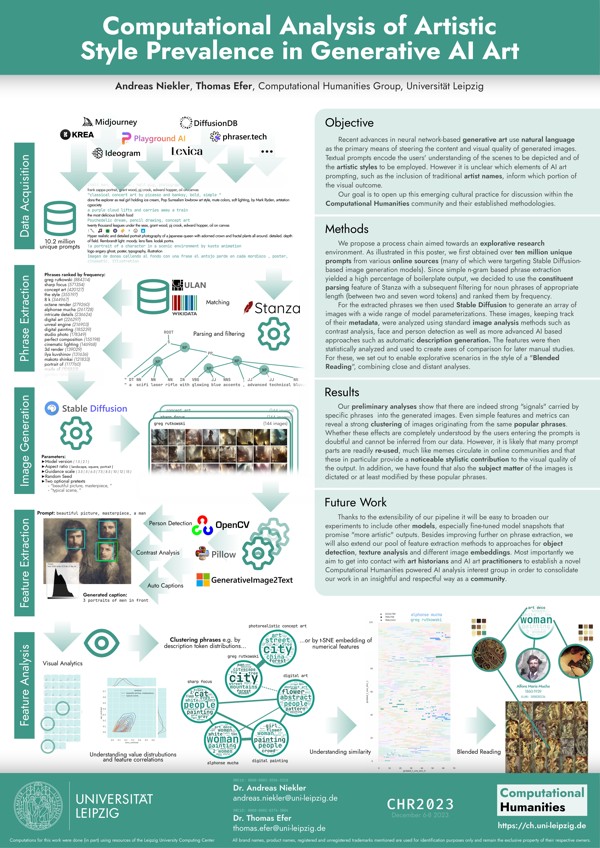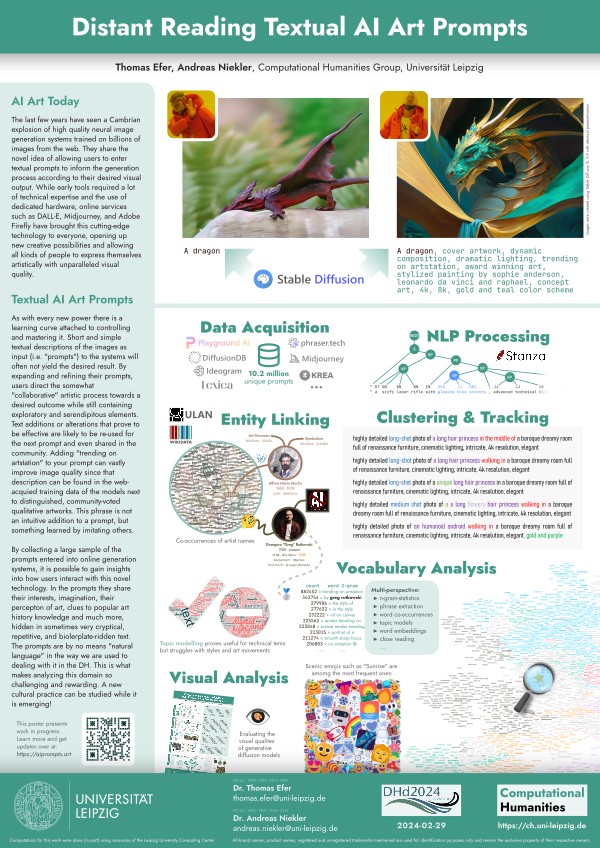AI Art Prompts as Corpus for the DH
We apply Digital Humanities methods to large collections of image generation prompts. Please note that this page currently only presents some of the work in progress and mainly provides access to scientific posters. More will be added over time.
SDXL-Lightning
Motivation
The current AI revolution has brought capable large language models to the masses. On their heels came generative image models controllable by natural language prompts. What insights can we get from this specific form of human computer interaction in crative scenarios?
Data
We collect and crawl publicly available prompt listings for different models, model versions and genres. The data is unified and cleaned. Individual sources can be found in the corresponding section below.
Methods
We aim to combine an in-depth textual analysis of the prompts (frequency analysis, topic modelling, phrase extraction, NER, network analysis, …) with the visual analyisis of generated images. We do not limit our studies to the images created in situ when the prompts were issued but want to capture the variability within the models.
Results
Current preliminary work suggests that the language used in the prompts is oftentimes very formulaic and differs in many cases systematically from natural language. At the same time prompts are longer, more specific and collectively created than queries to information retrieval or research systems. The visual analysis hints at strong stylistic influence being mainly caused by few keywords or phrases in the prompt. More details are presented on our posters.
About us
We are Thomas Efer and Andreas Niekler, postdoctoral researchers and lecturers from the Computational Humanities Group at Leipzig University. We have a background in NLP Technologies applied in the humanities and like to explore the possibilities of emerging AI technologies.
Call for collaboration
Did we spark your interest? Great! You work in a related field such as HCI, Art history, Literature Studies, Media Studies, Cultural Studies, or simply like working on interdisciplinary issues? We are looking for any scholarly input from humanities disciplines. Please contact us and let us talk!
Download our posters
Both are available as PDF files:
Computational Analysis of Artistic Style Prevalence in Generative AI Art
- phraser.tech
- Huggingface: bartman081523/stable-diffusion-discord-prompts
- Huggingface: poloclub/diffusiondb
- Huggingface: teo-sanchez/diffusiondb_ner
- krea.ai
- Github: Jeremy-Fuller/Prompts
- playgroundai.com
- lexica.art
- ideogram.ai
- deepai.org
- openart.ai
- Huggingface: succinctly/midjourney-prompts
- civitai.com
- pagebrain.ai
- Huggingface: Korakoe/NijiJourney-Prompt-Pairs
- midjourney.com
- arthub.ai
- sparklpaint.com
- ptsearch.info
- histre.com
- enterpix.app
- prompthero.com
- pixai.art
- pinegraph.com
- Github: google-research/parti
- Huggingface: FredZhang7/krea-ai-prompts
novelai.io


